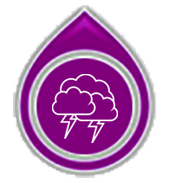Severe Storms
 You can prepare for potential hazards by having a plan in place to deal with the anticipated impacts of an event. Having your plan and emergency kit prepared in advance is the best way to support your family and pets. You may need to Shelter in Place or “hunker down” in your home for at least 72 hours (3 days) without needing to leave for supplies. Plan to be without power in many hazards that could occur.
You can prepare for potential hazards by having a plan in place to deal with the anticipated impacts of an event. Having your plan and emergency kit prepared in advance is the best way to support your family and pets. You may need to Shelter in Place or “hunker down” in your home for at least 72 hours (3 days) without needing to leave for supplies. Plan to be without power in many hazards that could occur.
Thunderstorms, hail, blizzards, ice storms, high winds and heavy rain can develop quickly and threaten life and property. Severe storms occur in all regions of Canada and in all seasons. Listen to the local radio or television stations for severe weather warnings and advice. Keep a battery-powered or wind-up radio on hand as there can be power outages during severe storms.
Before a severe storm
- If a severe storm is forecast, secure everything that might be blown around or torn loose. Flying objects such as garbage cans and lawn furniture can injure people and damage property.
- Trim dead branches and cut down dead trees to reduce the danger of these falling onto your house during a storm.
- Clean gutters, drains, and downpipes.
- Make sure your roof is in good repair.
- Secure everything that might be blown around or torn loose – indoors and outdoors. Flying objects such as garbage cans and lawn furniture can injure people and damage property.
- Stock up on heating fuel and ready-to-eat food, as well as battery-powered or wind-up flashlights and radios - and extra batteries. For a complete list of emergency supplies, go to emergency kits. Also, learn what to have in your car emergency kit.
- When a severe storm is on the horizon, the Meteorological Service of Canada issues watches, warnings and advisories through radio and television stations, the Weather Office Website, automated telephone information lines and Environment Canada's Weather radio.
- For more information go to Get Prepared - Before a severe storm
During a severe storm
- If you are indoors, stay away from windows, doors, and fireplaces.
- You may want to go to the sheltered area that you and your family chose for your emergency plan.
- If you are advised by officials to evacuate, do so. Take your emergency kit with you.
- Never go out in a boat during a storm. If you are on the water and you see bad weather approaching, head for shore immediately. Always check the marine forecast before leaving for a day of boating and listen to weather reports during your cruise.
- Do not go to the shore to watch the waves.
- If you are in a car, stop the car away from trees or power lines that might fall on you). Stay there.
- On a farm, the effects of severe storms on livestock are generally lessened by moving animals to avoid the storm; mitigating the storm's effect if it cannot be avoided; or sheltering the animals, ensuring they have access to food and water. The approach taken would depend upon the type of disaster anticipated.
- For more information go to Get Prepared: During a severe storm
Additional information specific to the type of storm

